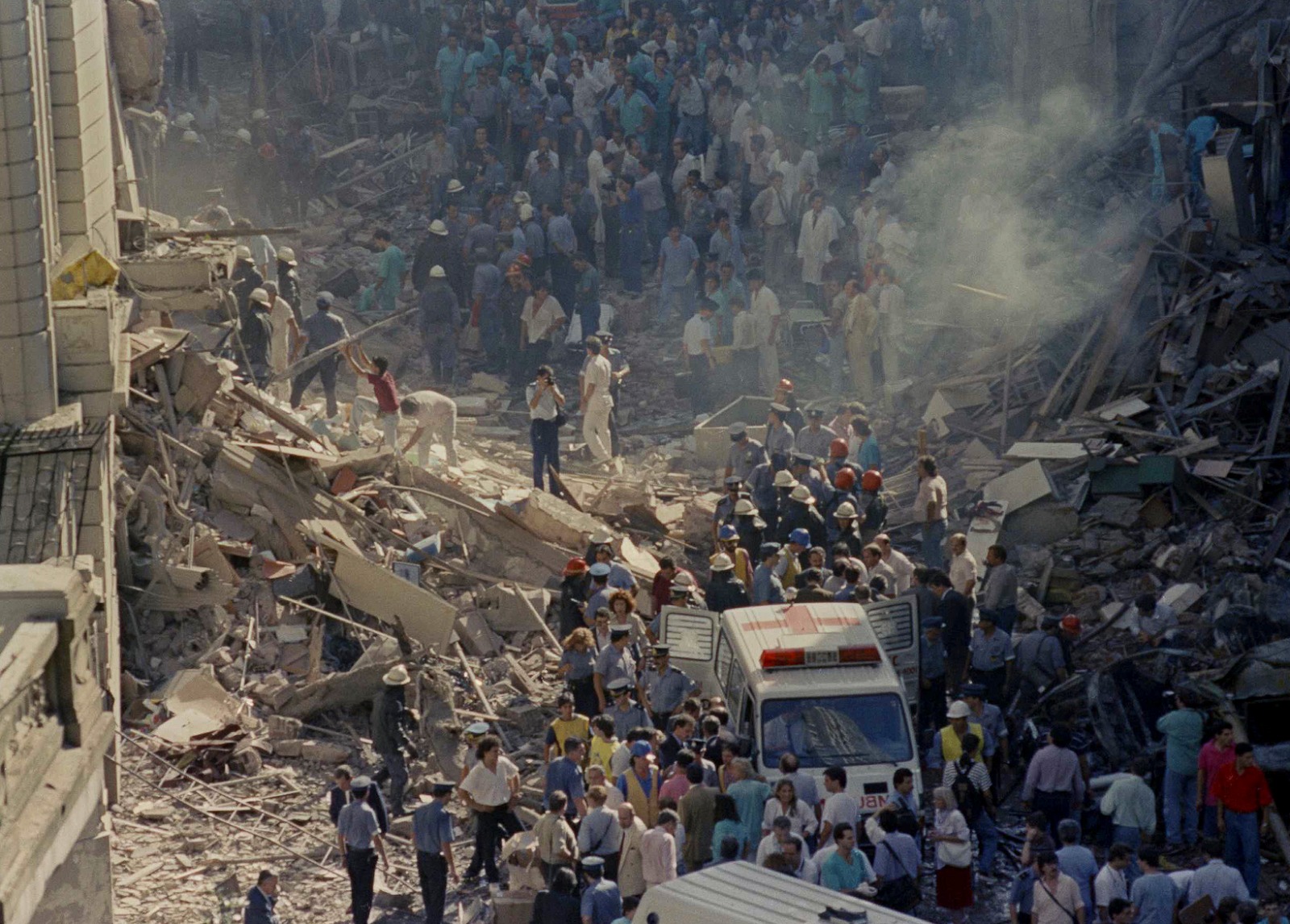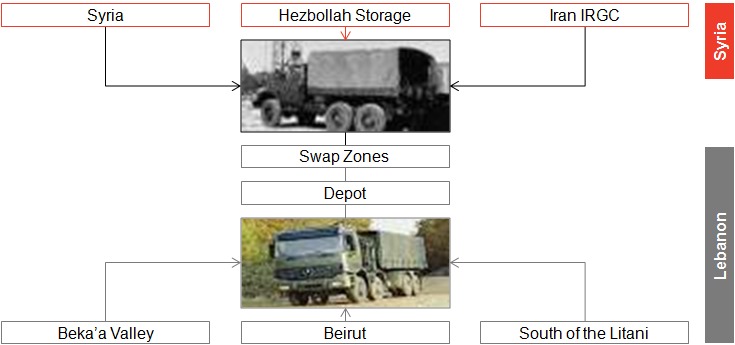Weapons, Drugs, and Global Terror: Hezbollah as an International Threat
For an organization established in 1985, Hezbollah has had quite the storied history. In their three decades, they’ve not only undermined the government and military of their native Lebanon, they’ve destabilized the entire Middle East – and that’s not all. With the help of their patron, Iran, and their ally, Syria, it has amassed an arsenal larger than that of most nation-states. Hezbollah has gained footholds all over the world. This Shiite militia from Southern Lebanon has grown into a sizable international threat.
Destabilizing the Middle East
As Iran’s proxy, Hezbollah trains, funds, and fights alongside armies and militias that promote Iran’s interests and ideologies. This means exacerbating conflicts throughout the Middle East and exporting chaos far beyond their borders. Alongside Iran’s Quds Force, Hezbollah has been gaining experience and weapons in Syria’s ongoing, bloody civil war.
Kata’ib Hezbollah, or “Hezbollah Brigades,” is Hezbollah’s Iraq-based counterpart. With funding, weapons, and training from Hezbollah and the Iranian Quds Force, they began fighting for Iranian interests in Iraq in 2003. They rose to prominence – or infamy – in 2007, with attacks on American forces, and are designated as a foreign terrorist organization by the US. Like Hezbollah proper, they’re also fighting alongside the regime in Syria.

![]()
Kata’ib Hezbollah militants marching over an Israeli flag. Source: Reuters
In conjunction with the Quds Force, they’ve also been training and arming the Houthi rebels in Yemen, drawing out the country’s proxy war between Saudi Arabia and Iran. The Houthis, whose motto is “God Is great, death to America, death to Israel, curse upon the Jews, victory to Islam,” are Zaydi Islamist insurgents bent on unseating Yemen’s government.
![]()

The Houthi logo, with their motto written in Arabic
Hezbollah and Iran also provide training and support to Palestinian Islamic Jihad (PIJ), an Islamist terror group. Palestinian Islamic Jihad have regularly fired rockets at Israeli civilians and encouraged large-scale terror attacks. Iran knows that wherever they need their violent ideology upheld, Hezbollah will offer knowledge, training, and tactics to enforce it.
Growing their web of terror
Even before Hezbollah officially announced its establishment, the group was already waging campaigns of terror aimed at the West. In 1983, they took aim at American targets, killing 241 American servicemen in a suicide bombing of their barracks in Beirut. They didn’t stop there.
Over the years, Hezbollah has built a worldwide terror network. This has allowed them to carry out bloody attacks against civilians in locations as far flung as Argentina, Egypt, Bulgaria, and Turkey. Cells have been uncovered in Cyprus, Nigeria, Thailand, Azerbaijan, and elsewhere. These cells were all in advanced stages of planning for attacks targeting Israelis.


The aftermath of the AMIA bombing in Buenos Aires, Argentina, in 1994. The Hezbollah attack killed 85 people.
But it’s never just been Israelis. Despite their ideological fixation on Israelis and Jews, Hezbollah has cells in over 40 countries. With their extensive international connections, they’ve taken aim at Sunni Muslims, a former prime minister, political opponents, humanitarian workers, and anyone opposed to Iran’s radical ideology.
UN Resolution 1701, which ended the Second Lebanon War 10 years ago, demanded that Hezbollah disarm. Despite this clear demand from the international community, Hezbollah has only expanded its arsenal. It has 45,000-50,000 operatives who have stockpiled over 100,000 rockets. For a non-state actor, they’ve amassed more weapons than any NATO country but the United States of America.


Hezbollah’s smuggling network
Participation in the international drug trade
These weapons and terror campaigns aren’t cheap. How does one Lebanese militia get the funds to support violent upheaval the world over? Besides for their Iranian patronage, they’ve found another source lucrative enough: The international drug trade.
Hezbollah has been implicated in drug trafficking and money laundering around the world. German police have caught Lebanese nationals transferring millions of euros to Hezbollah families in Lebanon, made through the European cocaine trade. And this isn’t the only transcontinental network Hezbollah is running.
Through “Project Cassandra,” which follows the terrorist group around the globe, the United States Drug Enforcement Agency has shown the reach of Hezbollah’s narcoterrorism. Hezbollah keeps extensive ties with cartels throughout Latin America, who help them supply illegal drugs to the United States and Europe. They may also be involved in drug trafficking throughout the African continent, according to the US State Department. The proceeds – to the tune of hundreds of millions of dollars – are laundered and sent to Lebanon through informal channels. From there, it becomes the funding and weapons that allow Hezbollah to continue exporting their terror.
Designation as a global terror group
Hezbollah operates globally, and the world has taken notice. The United Kingdom, New Zealand, Australia, and the European Union classify its military wings as terrorist organizations. The United States, the Netherlands, France, Canada, Bahrain, the Gulf Cooperation Council, and the Arab League have joined Israel in classifying all of Hezbollah in its entirety as a terrorist organization.
As Hezbollah continues torturing, starving, besieging, and murdering civilians throughout the Middle East, countries and groups that have once turned a blind eye to Hezbollah’s crimes are starting to see them as the international threat that they are. Even so, Hezbollah continues stockpiling weapons and stashing them among Southern Lebanon’s civilian population.
Most recently, the Secretary-General of the United Nations Security Council said: “The attack on 4 January proved Hezbollah’s military capability and its readiness and willingness to use such capability in violation of resolution 1701 (2006). The maintenance of arms by Hezbollah and other groups outside the control of the Lebanese State… continues to restrict the State’s ability to exercise full sovereignty and authority over its territory.” He continues, “I am deeply concerned at the readiness and willingness of Hezbollah to use its capabilities in violation of resolution 1701 (2006)…. Should Hezbollah’s possession of arms or attempts to procure sophisticated weapons provoke conflict, the consequences are potentially very grave for Lebanon and for the region.”
The IDF has always taken the threat of Hezbollah seriously. They sit on our northern border, and their massive missile arsenal is pointed at us. But Hezbollah has proven time and time again that they have their sights set on the whole map. When they’re planning across continents and seas, they’re not our threat alone.

